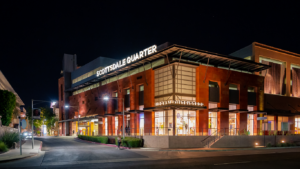Urban living is changing fast. Cities are growing, and space is limited. People need smart housing solutions that save space and money.
Have you heard about foldable homes? These unique houses can expand and collapse as needed. They are easy to move, set up, and store.
Many city dwellers now choose them for affordable and flexible living. Could this be the future of housing? Let’s explore the rising trend of foldable homes in urban real estate.

What Are Foldable Homes?
Foldable homes are compact houses that can change shape. They collapse for transport and expand for living. Engineers design them with strong, lightweight materials.
Some can unfold in minutes. These homes fit well in crowded cities. They offer a smart way to save space while still feeling comfortable.
People can use them for temporary or permanent living. Their innovative design makes them perfect for urban areas.
Some foldable homes come with built-in furniture, making them even more efficient. They can also include smart technology for better energy use.
How Foldable Homes Save Space in Cities
Big cities often struggle with limited housing space. Foldable homes help solve this problem. They take up less space when not in use.
People can expand them when needed and fold them when not. This design is great for small lots or shared housing. Some can stack or fit into tight spaces.
Cities can place them in unused areas. This makes housing more efficient and practical for growing populations.
These homes can also be stored in compact units when not in use. Some city planners are exploring ways to integrate them into public spaces.
The Cost Benefits of Foldable Homes
Buying a home is expensive. Many people cannot afford traditional houses. Foldable homes provide a cheaper alternative.
They use fewer materials, making them cost less. Assembly is faster, reducing labor costs. Some models are even cheaper than renting an apartment.
Homeowners save money on construction and maintenance. This makes homeownership possible for more people. Affordable housing is a big advantage in cities.
Some designs also allow homeowners to expand their space over time. Governments may offer incentives for purchasing foldable homes as affordable housing solutions.
How Foldable Homes Support Sustainable Living
Sustainability is important in today’s world. Foldable homes use eco-friendly materials. Many have solar panels and energy-saving features.
Some use recycled materials to reduce waste. Their small size means they use less energy. This helps the environment by cutting carbon emissions.
Living in a foldable home can reduce a person’s impact on nature. They support greener and more sustainable living in cities.
Many models come with water-saving fixtures. Some even use rainwater collection systems to reduce water waste.
The Convenience of Foldable Homes
Many people like foldable homes because they are easy to use. They can be transported quickly. Some can be set up in just a few hours.
This makes them useful for emergency housing or travel. They work well for people who move often. Some designs allow owners to change the layout.
This flexibility makes them more practical than traditional homes. They adapt easily to different needs and lifestyles.
Some models even include storage compartments within walls to maximize space. Their lightweight materials make transportation even easier.
The Role of Foldable Homes in Disaster Relief
Disasters leave many people without homes. Foldable homes provide quick housing solutions. They can be sent to disaster areas and set up fast.
Governments and charities use them to help victims. Their quick setup helps in emergencies. They offer a safe and comfortable place for people in need.
Many organizations now use them for disaster response. This makes them an important tool for relief efforts.
These homes are easy to transport by truck or helicopter. Some models include insulation for extreme weather conditions.
How Foldable Homes Fit Modern City Lifestyles
City life is busy and fast-paced. Many people want flexible housing. Foldable homes match this lifestyle. They are easy to relocate.
Some models even come with smart technology. Owners can control lighting and temperature with a phone. This makes city living more comfortable.
They also fit well in small apartments. Many young professionals choose them for their flexibility. These homes fit modern urban needs perfectly.
Some models even integrate with urban co-living spaces. Their modular design allows homeowners to customize their layouts.
The Future of Foldable Homes in Real Estate
Real estate is always changing. More people now prefer compact, smart homes. Foldable homes are becoming more popular.
Builders create new designs that are stylish and efficient. Some cities plan to use them for affordable housing projects. More companies invest in foldable home technology.
As demand grows, these homes will improve. The future looks bright for foldable homes in real estate.
Advances in materials may make them even more durable. Some companies are also working on self-assembling foldable homes.
The Growing Popularity of Foldable Homes
People love innovation in housing. Foldable homes are gaining attention worldwide. Many cities see them as a solution to housing shortages.
More people now choose them for affordability and convenience. Homeowners enjoy their unique and modern style. Social media showcases their creative designs.
Some architects even design luxury foldable homes. This trend will likely continue growing. More people will discover their benefits over time.
Foldable homes have been featured in international housing expos. Some designs cater specifically to off-grid living.
The Challenges of Adopting Foldable Homes
Every new trend has challenges. Foldable homes need city approval before being built. Some places have strict building laws.
Not all banks offer loans for these homes. People may worry about their long-term durability. Builders work to improve materials and designs.
Public awareness is still growing. More education about these homes is needed. Over time, laws and opinions may change.
These homes will become easier to own and use. Some insurance companies have yet to develop policies for foldable homes. The cost of advanced foldable home models may still be high for some buyers.
Discover the Trend of Foldable Homes in Urban Real Estate
Foldable homes are changing urban real estate. They provide affordable, flexible, and eco-friendly housing. Their space-saving design is perfect for cities.
Many people love their convenience and modern style. They also help in disaster relief and emergency housing. Some challenges remain, but their future is bright.
As technology improves, these homes will become even better. Could foldable homes be the future of city living? Time will tell, but the trend is here to stay.
Did you find this article helpful? If so, check out the rest of our site for more informative content.




